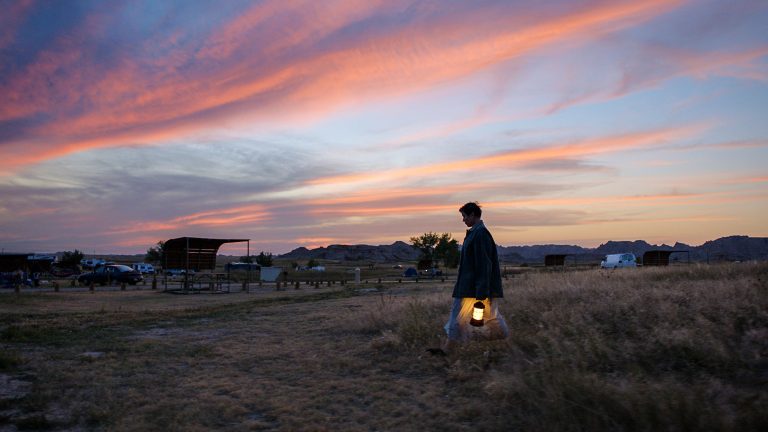
What makes a place a home? This is the theme explored by filmmaker Chloé Zhao, in the drama she wrote and directed: Nomadland. The story portrays the life journey of Fern — majestically played by Frances McDormand — who lives a vagabond life, making a virtue of necessity.
The death of her husband and the economic collapse of Empire, the company town in rural Nevada where they lived, leave her with nothing. The human settlement Fern used to call home has transformed into a ghost town; even the post-code disappeared in 2011 leaving her no other choice, but to pack her van and set off on the road, exploring a life that breaks with conventions.]
After winning the Golden Lion at the Venice Film Festival, Nomadland conquered four nominations for the Golden Globes: Best Film, Best Director, Best Screenplay, Best Actress. There are also great expectations for the upcoming 2021 Academy Awards. The positive achievements gathered by this film, can surely be found in the inspirational theme of travel and the way it sets in motion a series of mechanisms of personal growth. Those who wander escape the insulation of their comfort zone, expand their circle of empathy, deepen their understanding, and increase their self-awareness.
The subtlety of the film is how it blends genres, to convey a social phenomenon with great humanity. This is Zhao’s hallmark, since in her previous features films (Songs My Brothers Taught Me and The Rider), she coalesced narrative storytelling with non-fiction. This approach is glorified in Nomadland, through an immersive cinematic experience, as professional actors mix with real Nomads, living in their camper vans. What inspired the Beijing-born director, who was raised between the United Kingdom and the United States, was Jessica Bruder’s novel Surviving America in The Twenty-First Century — that she adapted for cinema unveiling the hardships of third age Americans who can’t afford to retire and are obliged to search for employment, by traveling the country on their four-wheeled homes.
As all good road movies it’s all about the journey and sympathetic encounters; not the destination. Fern will confront people who see her as a homeless, but she likes to clarify she is simply “houseless,” but will also find she belongs to a community of “those lucky people that can travel anywhere.” The audience is catapulted in a Nowhereland of subdued atmospheres and quiescent sensations, a quiet and solemn Inferno of lost souls who live in a parallel dimension. Nomads are seen by those who live in traditional houses as itinerant, destitute people. But as we get acquainted with these vagabonds on wheels, it becomes palpable how Nomadland gives back decorum and decency to this growing subculture. The film provides food for thought, in relation to how any place can be transformed in that secure haven one calls home. Fern carries in her van, items that were part of her family history and she has decorated every corner of her moving home with pieces of her previous life.
Chloé Zhao conveys a sociological analysis that goes beyond a mere depiction of vagabondage. As one of the characters in the film says: “What the Nomads are doing is not that different than what the pioneers did.” Hence, Fern as much as the other people leading an existence on the road, are part of American’s endemic tradition, and they all carry a hefty baggage. The struggle and pains, the turmoils and hardships in life, are portrayed by every Nomad with utmost dignity, whether it is a medical condition or a financial circumstance. They are all subsisting on the bare necessities, while going through an interior journey. Each traveller is processing a trauma.
Every wanderer is striving for healing. And the journey becomes a soothing agent, where people place themselves at a crossroad in life, and never say a final goodbye.
Nomads are the ones who embody the German term ‘Fernweh,’ that is a longing for distant places, a wanderlust for what is yet to come.
They do not feel homesickness, because they carry their home wherever they go, but they know very well the feeling of ‘farsickness.’ The times we are living in, make us relate to this feeling of ‘far-woe’: the pandemic has locked us in our homes of bricks and stones, and travel restrictions annihilate lust for travel. Today, we therefore look at Nomads with new eyes, since they possess an enviable call to freedom that we all crave.
Final Grade: A-

